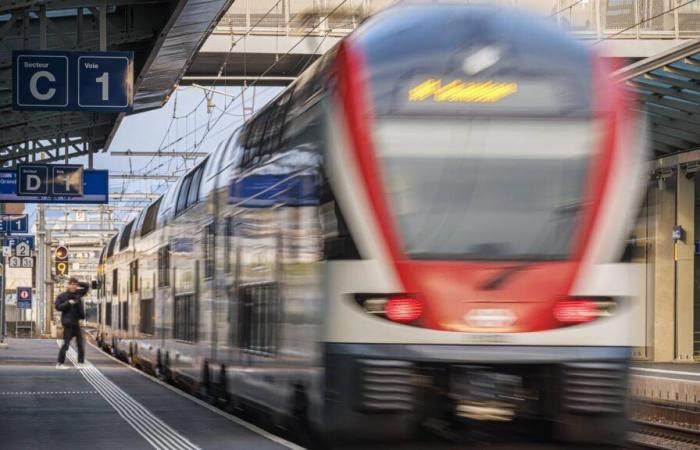As a median, on the French-speaking network, trains were 13 seconds behind the planned timetable. “This punctuality has never been achieved in French-speaking Switzerland for several years,” exclaimed Mr. Fattebert. The Broye line, however, tarnished this result a little. “We still have big infrastructure challenges in this region,” he said.
Well-informed commuters
The fifty customer assistants present in the main stations in the region have been little used. “Commuters were generally very well informed,” observed Mr. Fattebert.
Trains between 7 and 8 a.m., particularly frequented by commuters, will be subject to increased monitoring in the coming days. “Measures will have to be taken to ensure that passengers are spread out along the entire length of the train,” he added.
The change at Renens, which has become necessary for certain journeys between Neuchâtel and Geneva, was also closely examined by the CFF. “Both elderly people and families with luggage managed to change platforms without stress and in less than three minutes, while the connection time is five minutes,” rejoiced David Fattebert.
“A happy farm manager”
“Today I am a very happy operations manager,” declared Patrick Michaud, head of the Renens operations center. “Of course, some trains run late, but managing these problems is part of our daily work.”
No less than 2,500 trains run every day on the 800 kilometers of railway tracks in French-speaking Switzerland. Some 500 incidents take place daily, the vast majority of which go unnoticed by travelers.
More trains for French-speaking people
The CFF timetable change which took place on Sunday is the most significant in 20 years in French-speaking Switzerland. The basic structure of the timetable, dating from the 2000s, has been adapted to absorb the constraints linked to the numerous modernization and development projects of the railway infrastructure. If the departure times of almost all trains in French-speaking Switzerland have been modified, French-speaking customers now have around 15% additional trains, underlines the former federal authority.
Renens, for example, has been served by mainline convoys since Sunday, while the offer between the foot of the Jura, via Bienne, Neuchâtel, Yverdon-les-Bains and the Lausanne/Renens railway junction is reinforced. IC5 trains will run every half hour on this axis.
Nighttime offers in the cantons of Vaud and Geneva are also improved, while CarPostal is increasing its services. The most significant changes affect the Lausanne-Geneva axis.
Neuchâtel, Friborg and Valais are winners
In Neuchâtel, in particular the lines at the bottom of the canton, and in Fribourg, users will benefit from a strengthening of the offer and connections. In Valais, an extension of PostBus lines is planned in the St-Maurice region.
In Haut-Valais, several new morning connections will appear to ensure connection with the first train towards Bern. The Jura residents, for their part, will not see major changes, but simply small adaptations.
New night trains
The rest of Switzerland is also seeing developments, including new night trains and more connections to neighboring countries.
The numerous construction sites will sometimes lead to longer journey times or force travelers to change trains more often, CFF warns. They recommend that their customers consult the timetable online on CFF. ch or in the SBB Mobile app before each trip.






